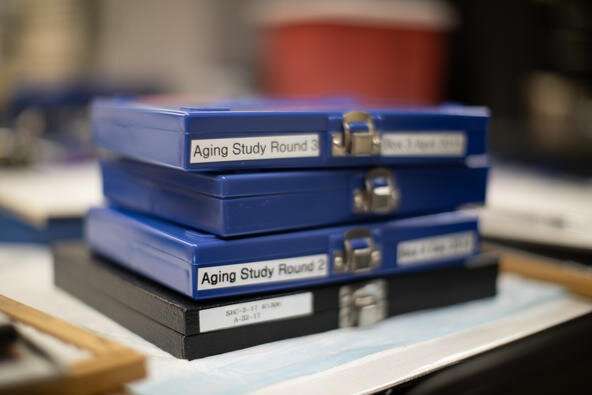Researchers publish article exploring if social distancing will lead to ‘research distancing’


COVID-19 has dramatically altered everyday life around the globe. Ongoing research studies are not immune to the disruptions and changes caused by the global pandemic. Researchers at the University of Kentucky’s Sanders-Brown Center on Aging (SBCoA) are continuing their important work amid COVID-19 by implementing many safety guidelines and protocols. While navigating this uncharted territory for many, Alzheimer’s disease and dementia research poses an added obstacle as the aging population is believed to be at greater risk from the virus.
Those working in clinical research are faced with the challenges of ‘social distancing’ recommendations and how that ultimately could lead to ‘research distancing. That is the focus of an article recently published in the Alzheimer’s Association journal Alzheimer’s & Dementia: Translational Research & Clinical Interventions (TRCI). SBCoA clinical core members Dr. Greg Jicha, Shani Bardach and Elizabeth Rhodus, along with Allison Gibson from the College of Social Work, contributed to the article. In it they write, “For those of us working in the area of Alzheimer’s disease (AD) prevention and treatment, it is important to take stock of the immediate impact, anticipate some ongoing effects, respond to current needs, and anticipate challenges.”
The article looks at three different challenge areas. The first is study integrity. “The immediate impact of COVID-19 includes analytic challenges with ongoing studies that, due to requirements for social distancing, will now have inconsistent adherence to protocols as designed with visit schedules, medication and intervention adherence all more fluid than in ideal circumstances.” They believe addressing this particular challenge will require skilled statisticians but that it is necessary to ensure that researchers do not incorrectly conclude that a new treatment is ineffective due to midstream pauses and interruption of drug dosing. Another difficulty in maintaining study integrity the foresee, is the possibility of higher than anticipated study attrition leading to failed trials.
The other challenge areas discussed include regulatory and industry issues as well as the impact on current participants and prospective recruitment. The authors believe current social distancing requirements could have long-lasting effects, including apprehension about social contact and choices to remain more isolated to protect one’s health.
To help combat the challenges discussed, the authors also outline some changes they hope to see within the clinical trial landscape. A significant portion of that is dealing with remote data collection. They say they anticipate increased investment in the development of remote tools and assessments to enable the gathering of clinical and neuropsychological data from the participant’s home. While they say that will be a very much welcomed move, it will also pose its own challenges, “To ensure that we do not exacerbate existing health disparities by leaving those without access to technology, which may be required for remote monitoring activities, behind.”
Source: Read Full Article